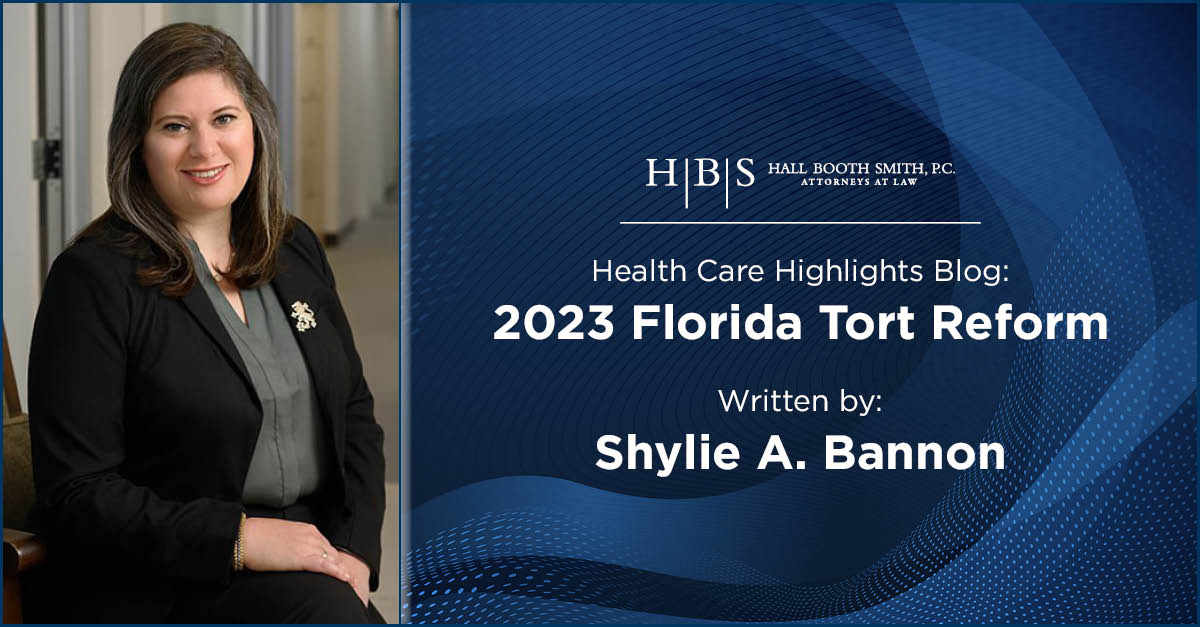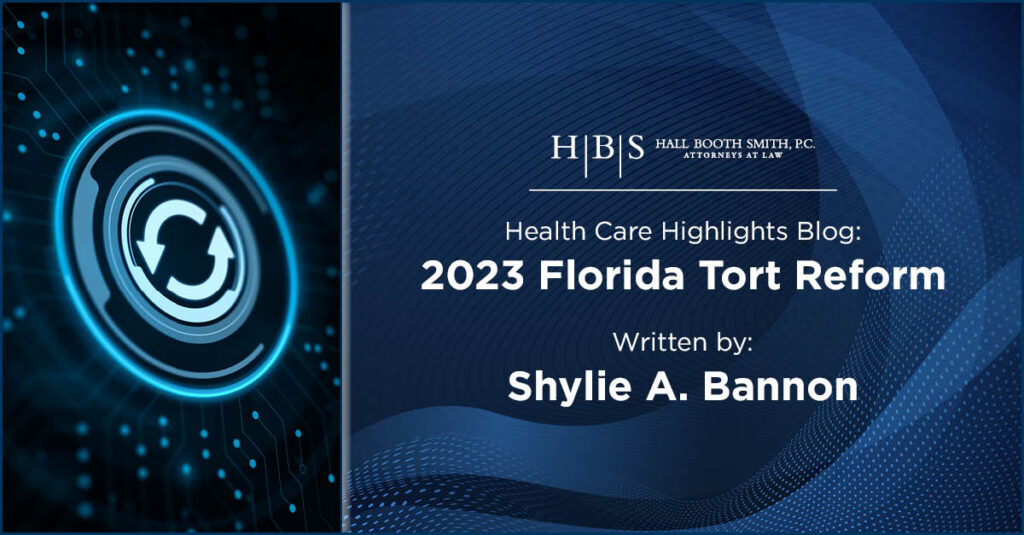
2023 Florida Tort Reform

Written by: Shylie A. Bannon, Esq. | Print Blog
Florida Governor Ron DeSantis recently signed significant tort reform legislation into law after House Bill 837 passed through the House and its companion bill was passed in the Senate. This is the most significant tort reform legislation to be enacted in Florida since the early 2000s, when the legislature enacted non-economic damage caps on medical malpractice cases and when it abolished the doctrine of joint and several liability in 2006.
The enactment of HB 837 stands to level the playing field between claimants and defendants by modifying Florida’s comparative negligence system from the “pure” standard to the “modified” standard, providing uniformity to the evidentiary threshold necessary to prove damages for medical expenses in certain civil actions, require certain disclosures in regards to claims for medical expenses for treatment rendered under letters of protection, shortening the statute of limitations for negligence actions, standardizing bad faith actions, addressing runaway attorney’s fees awards, and altering presumptions in certain negligent security matters.
Some of the major highlights of this bill include the following provisions.
New Modified Comparative Negligence Standard
HB 837 replaces Florida’s current pure comparative fault system with a modified comparative fault system. Under a modified comparative fault system, any claimant found to be at least 51% liable for an incident cannot seek reparation from the other party.
What is yet to be determined is how Florida Courts will instruct juries on the new modified comparative negligence standard. In the majority of “modified comparative” states, juries are informed that if they find a plaintiff to be comparatively negligent in excess of 50%, then the plaintiff will not recover, and as a result, many juries only find a plaintiff to be 49% negligent. In a minority of states, the jury is not informed of the bar to recovery at 50%. HB 837 is silent as to whether the jury should be informed of this bar to recovery.
Statute of Limitations
HB 837 also changes the Statute of Limitations in negligence actions by cutting the current statute in half. Now, claimants will only have two years from the time the cause of action accrues to file suit. This change will only impact causes of action which accrue after March 24, 2023.
Attorney-Client Privilege for Treating Physicians
HB 837 further equals the playing field between claimants and defendants/insurers by effectively overturning Worley v. Central Florida YMCA. The referral and financial relationships between plaintiff’s personal injury firms and treating physicians will no longer be protected by the attorney-client privilege.
This solves a long-lasting point of contention because insurer’s payments to their own experts have long been discoverable. Under HB 837, payments made by personal injury firms to treating and “hybrid” expert physicians will now also be discoverable.
Attorney Fees
HB 837 eliminates multipliers for attorney fees. Under the new law, the Lodestar fee, i.e., the number of attorney hours reasonably expended on the matter multiplied by the reasonable hourly rate, is strongly presumed to be sufficient and reasonable and can only be overcome in a rare and exceptional circumstance where it is demonstrated that competent counsel could not be otherwise retained.
In actions for declaratory judgment to determine insurance coverage, there are no assignments of benefits which may be made for attorney’s fees, and one-way attorneys fees have been eliminated in many contractual actions involving insurers.
New Standards of Admissibility for Medical Damages, both Past and Future
Perhaps the most impactful changes HB 837 brings are the new evidentiary thresholds for a plaintiff in a personal injury action to prove their past and future economic damages for medical costs and the bright-line evidentiary rules concerning the admissibility of the same for consideration during trial.
In general, under the new law, evidence offered to prove the amount of damages for past medical treatment in personal injury and wrongful death actions will be limited to evidence of the amount actually paid to the medical providers, whether by a health insurance provider, worker’s compensation insurance carrier, auto carrier under Personal Injury Protection benefits, or a medical/litigation financing company which has purchased a plaintiff’s outstanding account from a health care provider at a discount below the invoice value.
Further, evidence offered to prove the amount necessary to satisfy unpaid charges will be limited to the amount the claimant is obligated to pay should the claimant have health care coverage other than Medicare or Medicaid.
If a claimant has health care coverage and receives treatment under a letter of protection, the claimant will only be able to board the amount the claimant’s health care coverage would pay the medical provider to satisfy the past unpaid charges under the insurance contract or applicable regulation. If the claimant does not have health care coverage or maintains health care through Medicare or Medicaid, evidence offered at trial will be limited to 120% of the Medicare reimbursement rate in effect on the date of the incurred treatment or 170% of the applicable state Medicaid rate.
The claimant must disclose the letter and an itemized billing ledger for the claimant’s medical expenses before asserting any claim for medical expenses rendered under a Letter of Protection. Further, if a medical provider sells a patient’s account to a medical/litigation financing company, the claimant must disclose the identity of the financing company and the dollar amount for which the account was sold, including any discount provided below the invoice amount.
Regarding future medical expenses, the jury will be permitted to learn the amount that Medicare, Medicaid, or a private health insurer would pay for future medical expenses, superseding the current law as was established by the Florida Supreme Court in 2015 when it issued its opinion in the Joerg v. State Farm Mutual Automobile Insurance Co. case.
How discovery will be accomplished in order to establish the amounts which would be paid if a claimant were to use private health care or commercial insurance will inevitably be a battleground in Florida Courts. HB 837 provides explicit protections to commercial insurers and HMOs from discovery of the individual contracts between health care providers and those organizations. We anticipate that medical providers will secure counsel and intervene as non-party litigants in many cases, asserting trade secret and confidential business information objections to discovery requests which will be served.
Florida’s Bad Faith Law
The new law explicitly mandates that mere negligence alone is insufficient to constitute bad faith in both statutory and common-law actions. The law also imposes a duty on the claimant and the claimant’s attorney to act in good faith when furnishing information regarding the claim, issuing demands, setting deadlines, and attempting to settle.
HB 837 will create an immunity in bad faith actions where the insurance carrier tenders the lesser of either the policy limits or the amount demanded by the claimant within 90 days after receiving actual notice of a claim that is accompanied by evidence to support the amount at issue. Where there are multiple claimants in a single bad faith action, the bill allows the insurer to pay the total amount of the policy limits through an interpleader action at the outset. This will work to limit the insurer’s bad faith liability and makes the claimants compete against each other for a share of the money.
Finally, HB 837 provides for separate court proceedings to divide payouts between policyholders and any third parties, such as auto passengers, injured in any accident. The carrier will not have to pay third parties any amount in excess of the policy limit. These changes will reduce, and hopefully eliminate the “set-up” culture that has permeated the pre-suit demand process.
Protections for Apartment and Multi-Family Properties in Claims Arising from Allegations of Negligent Security
HB 837 also provides new liability protections for owners and operators of apartment and multi-family properties. Property owners and operators will now be entitled to a presumption against liability when a third-party, non-employee criminal injures a resident on the property if the owner/operator takes certain precautions including:
- Installing security camera systems at points of entry and exit that maintains retrievable footage for at least 30 days
- Maintaining a lighted parking lot from dusk until dawn
- Maintaining lighted walkways, laundry rooms, common areas, and porches
- Installing at least 1-inch deadbolts on each dwelling unit door
- Installing a locking device on each window
- Installing locked gates with key or fob access along pool fence areas
- Installing peepholes or door views on each dwelling unit door that does not already include a window
Further, by January 1, 2025, the owner/operator of a multifamily residential property must have a crime prevention through environmental design assessment that is no more than 3 years old completed for the property and must provide proper crime deterrence and safety training to its current employees and continues to do so on an ongoing 3-year cycle. After January 1, 2025, new employees must be provided such training within 60 days after being hired.
The burden of proof for purposes of establishing the presumption against liability is on the owner or principal operator to demonstrate that the owner or principal operator has substantially implemented the security measures specified. We anticipate that there will be significant litigation over the meaning of “substantial implementation” of the specified security measures.
HB 837 will require the criminal(s) to be identified on the verdict form for the jury to consider apportioning liability to them when adjudicating negligent security cases against property owners. This is a significant departure from the current state of the law, which precludes the inclusion of intentional tortfeasors from the verdict form in negligence actions. This change will bring Florida in line with some of its neighbor states, including Georgia.
Looking Ahead
Although the bill was modified from its initial form through the Legislative session, HB 837 changes the way that claimants, their attorneys, business owners, and insurers value claims in the State, and it will help Florida escape its notorious reputation as a “Top 5 Judicial Hellhole” in the United States. The bill levels the playing field between claimants and defendants and discourages frivolous lawsuits.
We will monitor and report key developments following the enactment of the bill, including opinions and revisions to the Florida Rules of Civil Procedure, Florida Standard Civil Jury Instructions, and key cases interpreting the new legislation enacted by the bill, which will inevitably include challenges to the constitutionality of these provisions. If you have any questions, please do not hesitate to contact any member of the HBS team.


Leave a comment
You must be logged in to post a comment.